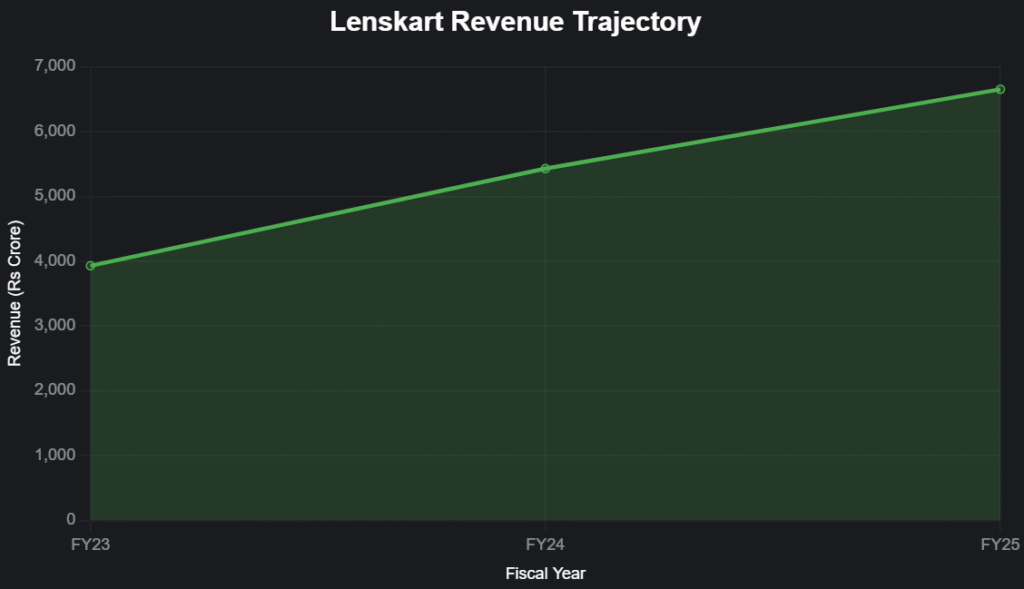Peyush Bansal, the Microsoft alum who traded corporate stability for entrepreneurial grit, launched Lenskart in 2010 to make quality eyewear accessible to India’s vision-impaired masses. Now a $4.5 billion omnichannel powerhouse with over 2,000 stores across 14 countries and FY25 revenue of Rs 6,652 crore, Lenskart is accelerating expansion ahead of a $1 billion IPO, highlighting the eyewear sector’s untapped potential where nearly one billion Indians will need vision correction by 2030, yet fewer than 40% currently access it.
Table of Contents
Early Focus: From Delhi Roots to Global Ambitions
Peyush Bansal was born on April 26, 1985, in New Delhi into a Hindu family, where his father’s role as a chartered accountant instilled values of precision and perseverance. He pursued a Bachelor of Engineering in Electrical and IT from McGill University in Canada, graduating in 2006 before joining Microsoft in the US as a program manager, working on Windows Vista and Office.
A 2007 trip to India revealed stark gaps in eyewear access—high costs and poor quality left millions underserved. “I realized eyewear could be a massive opportunity if we made it affordable and reliable,” Bansal later shared in a 2024 Forbes India interview. Returning home, he bootstrapped SearchMyCampus, a student services portal, and co-founded Valyoo Technologies in 2008 with Amit Chaudhary, Sumeet Kapahi, and Neha Bansal, launching niche e-commerce sites like Watchkart and Jewelskart.
Launching Lenskart: A Clear Path to Disruption
In November 2010, Bansal pivoted Valyoo’s efforts to Lenskart.com, starting with contact lenses sold online to bypass traditional opticians’ markups. The name evoked “lens” and “smart,” symbolizing intelligent access to vision care. Early challenges included supply chain woes, but by 2011, Lenskart expanded to spectacles and sunglasses, introducing home try-ons and virtual fitting tech.
“We built for India—cash on delivery, easy returns, and prices under Rs 500,” Bansal told StartupTalky in 2025. The model resonated, hitting profitability in 2018 and launching in-house brands like John Jacobs in 2017. Katrina Kaif became its first ambassador that year, boosting visibility.
Growth Through Investment: From Unicorn to Global Player
Lenskart raised $1.08 billion over 19 rounds from 57 investors, including SoftBank’s $275 million in 2019 that minted it a unicorn at $1 billion. Subsequent infusions—$95 million from KKR in 2021, $220 million from Temasek and Falcon Edge—pushed valuation to $2.5 billion, then $4.5 billion by 2025.
Founders reinvested $20 million in 2024, led by Bansal’s Rs 70.7 crore stake. This fueled a Rajasthan manufacturing plant with 5 crore annual capacity and AI-driven eye tests. By FY25, Lenskart served 105 million website visitors and 100 million app downloads globally, with Japan (via 2022’s $400 million Owndays acquisition) contributing 14% of revenue.
Lenskart Revenue Growth

Source: Company filings cited in Business Standard and YourStory.
Beyond the Lens: Shark Tank and Social Good
Bansal’s profile soared as a Shark Tank India judge since 2021, investing in 23 startups and earning praise for his empathetic style. In a February 2025 episode, he defended a pitcher’s execution against criticism, underscoring fair evaluation.
Philanthropy drives him too: Lenskart’s “Buy One, Give One” has donated over 1 million pairs to underprivileged children, aligning with his mission to combat visual deprivation affecting 600 million Indians.
Challenges and Resilience: Navigating Franchise Friction
Growth wasn’t seamless. In October 2024, Karnataka franchisees alleged fraud and revenue discrepancies, prompting an FIR. Lenskart secured a Karnataka High Court stay in January 2025, denying claims and emphasizing transparency. Bansal addressed it in a 2025 ET interview: “Franchise partnerships are core; we’re committed to equitable growth.”
These hurdles underscore omnichannel tensions but haven’t dimmed momentum, with EBITDA at Rs 971 crore in FY25, up 44.5%.
Why Lenskart Illuminates the Future
Lenskart matters by democratizing eyewear—affordable, stylish, and tech-enabled—for a billion potential users, creating 4,000 jobs and supporting local manufacturing. Bansal’s journey—from McGill to Shark Tank—empowers young founders, particularly in healthtech, where vision care lags.
With 450 new stores planned for FY26 and a $1 billion IPO eyeing $10 billion valuation, Lenskart targets Southeast Asia and the Middle East. As Bansal reflected in a 2025 Business Standard piece, “We’re not just selling glasses; we’re changing how India sees the world.” His blend of innovation and inclusion offers a blueprint for sustainable retail in emerging markets.
In a blurred economic landscape, Lenskart brings everything into sharp relief.

Also read: Empowering Digital India: Vijay Shekhar Sharma’s Paytm Revolutionizes Fintech and Financial Inclusion
Instagram Post Title: 👓🦈 (18 words)
LinkedIn Summary (45 words):
Last Updated on Friday, October 17, 2025 4:18 pm by Siddhant Jain